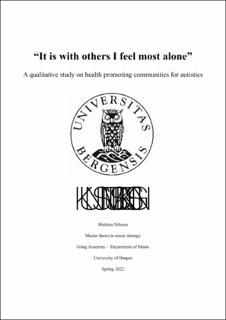“It is with others I feel most alone” - A qualitative study on health promoting communities for autistics
Master thesis
Permanent lenke
https://hdl.handle.net/11250/2998382Utgivelsesdato
2022-05-20Metadata
Vis full innførselSamlinger
Sammendrag
Autistics have been excluded and mistreated by society for decades, due to a fundamental misconception of what the lived experience of autism entails. Alienated by their environment, autistics have been left alone to deal with their resulting crippled mental health and a staggering suicide rate. For this thesis I have conducted two focus group interviews with five other autistics about what they think the future should hold in terms of health care services. In response I got plenty of insight and suggestions. Most notably was the general emphasis on meeting other autistics, as well as sharing knowledge and insight with non-autistics. Thus, I discuss how community music therapy might provide a suitable arena for addressing the issues and goals raised by the informants. However, before community music therapy presents a viable option for promoting autistics health, I suggest the discipline needs to be further developed in three main aspects, (1) the affordance of a safe space and framework for conducting community music therapy; (2) providing autistics with diverse environments where they can nurture distinct relationships; and (3) implement the autistic voice into music therapy education, and teach students how to reflexively incorporate clients’ voices into the shaping of community music therapy practice.
